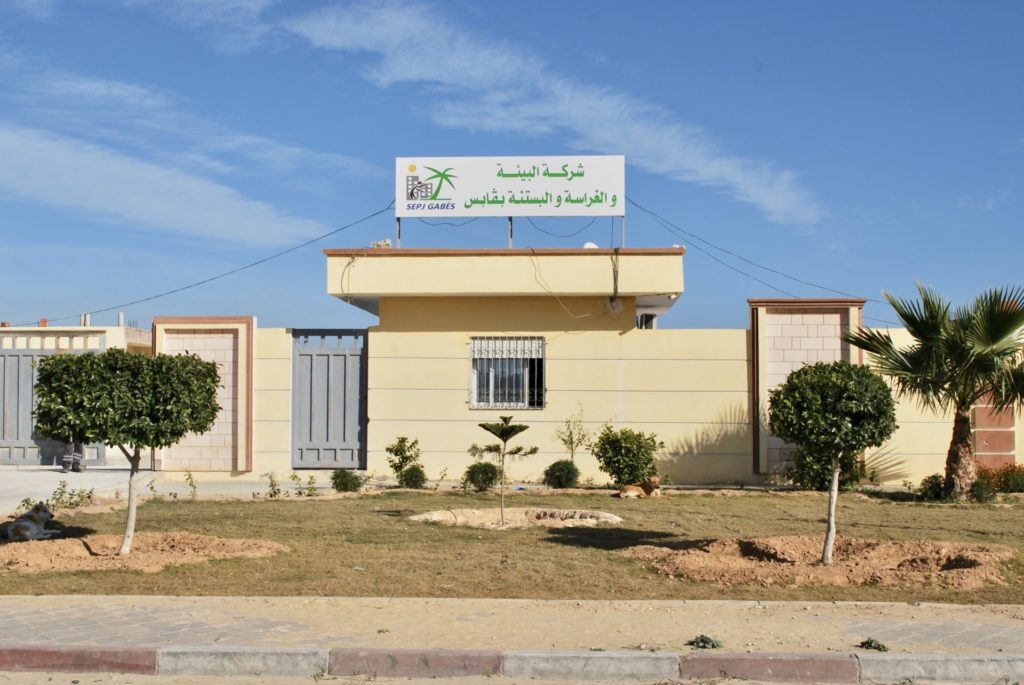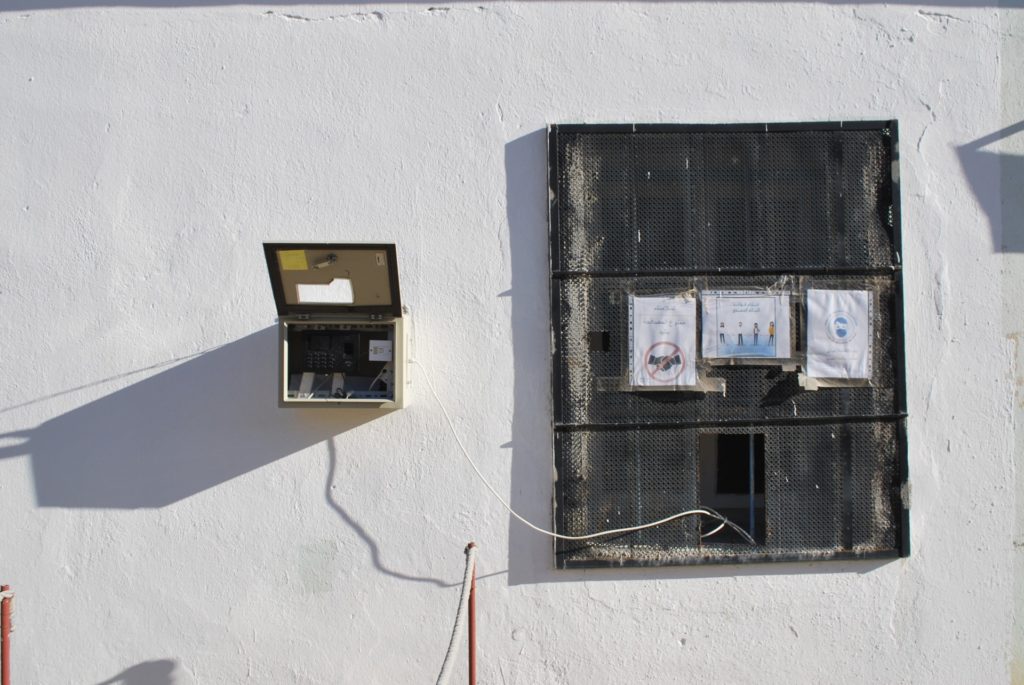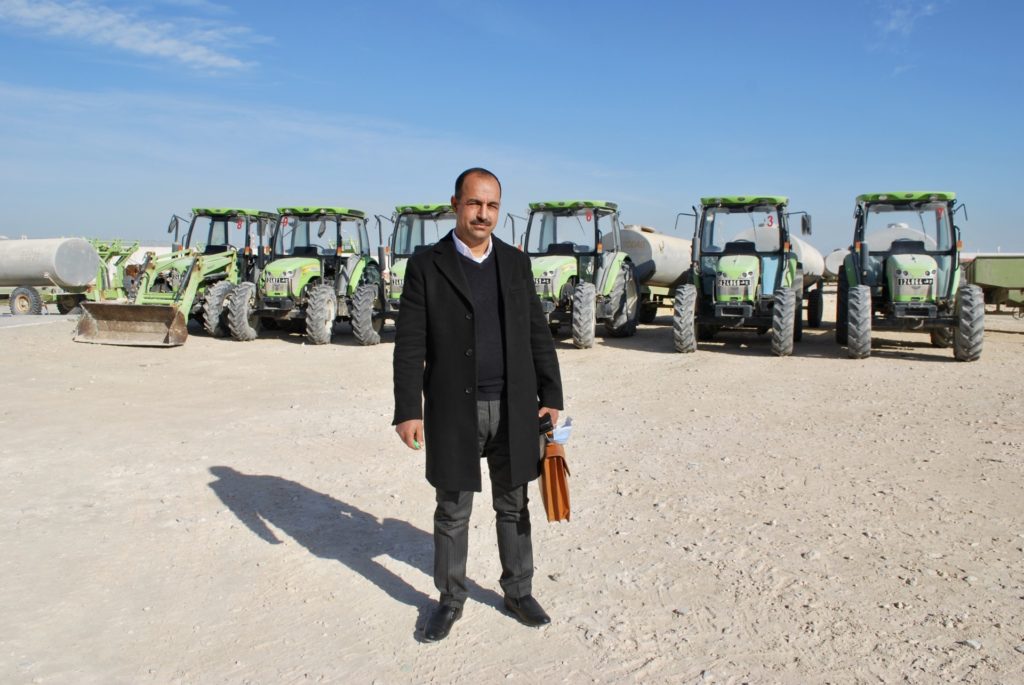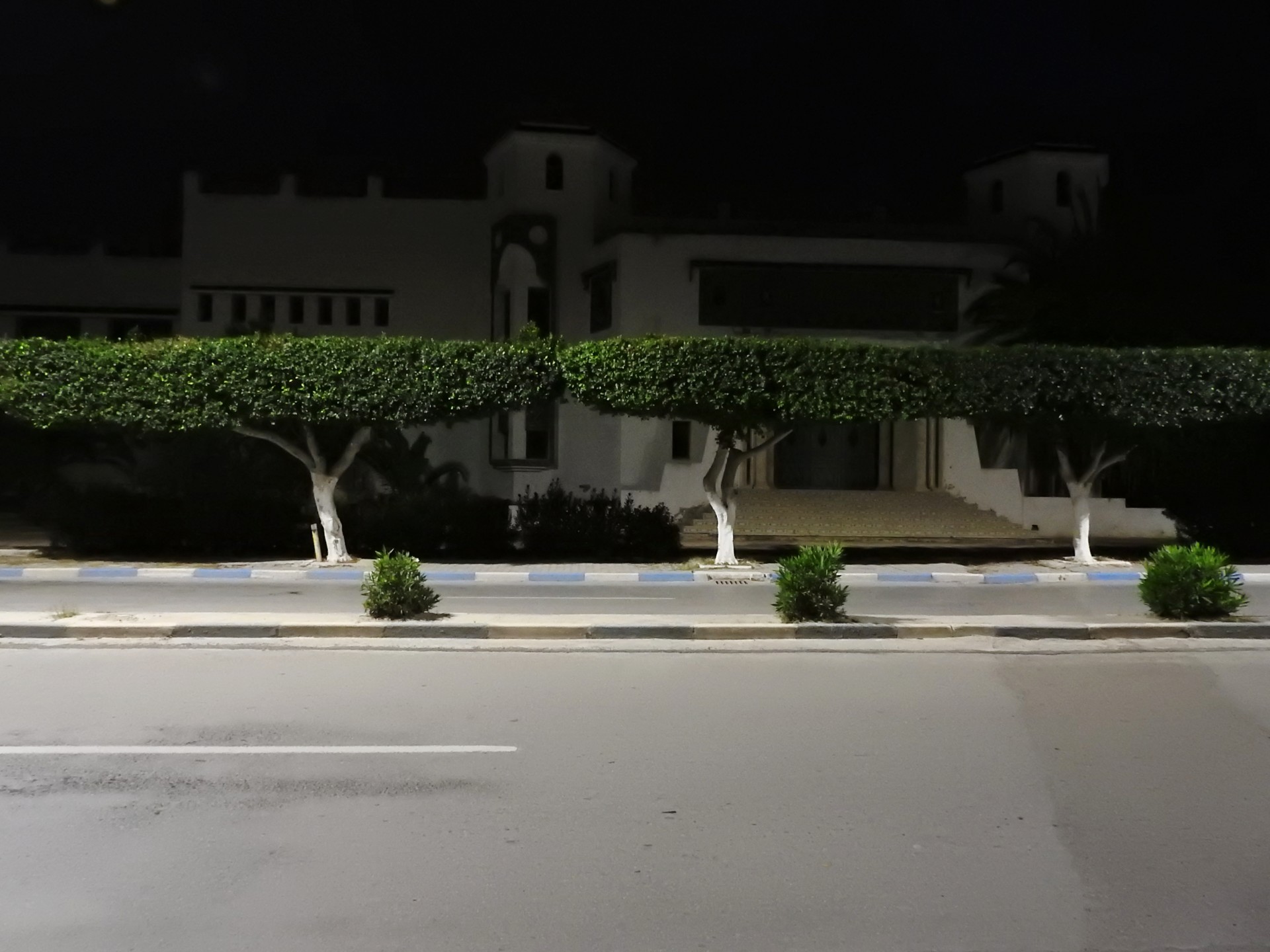The most environmental thing about the Société de l’Environnement et Plantation in Redeyef, Tunisia, is its color scheme. When I visited the phosphate mining town in the region of Gafsa, workers were painting the walls of the company administration building green. The painters were the only company employees to have worked that day. Ammar Alaa, the payments manager who was managing the painting work, confirmed that nothing else was happening. “We have 300-400 managers and nowhere to put them,” he said, frustratedly. “The only activity we’re doing is the pointage (clocking in), and even that we’re not doing now because of (COVID-19).”
This company, known by its French acronym SEP, is one of many such structures set up to absorb Tunisia’s rising number of unemployed following unrest in the regions where the phosphate and gas and oil industries operate. Most of the 17,000 employees are located in the southern regions of Gafsa, Gabès, and Sfax, where phosphate rock is mined and processed for use as fertilizers, preservatives, and acids; their salaries are paid by the Compagnie de Phosphates Gafsa (CPG) and the Groupe Chimique Tunisien (GCT), both state enterprises. Outside of the phosphate circuit, in Tataouine and Kebili, following protests in 2017, similar companies were set up under the Ministry of Agriculture.

Some of them add a “J” for jardinage (gardening) to their title, but in both cases — SEP or SEPJ — company activity is poorly defined: Some have planted trees in public places, others have dabbled in agriculture or washed cemeteries, but the majority do nothing. Only 12% of the Redeyef SEP employees work, but it has the optics of a company. Next to the green building is another building with a storeroom filled with glossy, orange spades and rakes, as well as an archive room full of documentation — bills, payment slips, and workers’ files dating back to 2011 — that they are hoping to digitize, I am told by Mohamed Abidi, the deputy director, who was due to visit the capital the following week for professional training courses in accounting and stress management. “My work is very stressful; the employees are very angry,” he reasons.
Chokri Rouissi, director of the SEPJ in the main town in Gafsa, insists that such an ambitious social recruitment plan is a positive thing. “Every Tunisian has the right to work,” he said. Indeed, there have been positive experiences of governments deciding to employ people en masse for social reasons in a time of economic hardship, such as the Works Progress Administration in the United States as part of President Franklin D. Roosevelt’s New Deal to ride out the Great Depression. Bridges were built, schools were repaired, and artistic movements flourished thanks to the WPA. This, however, is not that. Tunisia’s phantom landscaping sector comes closer to the logic of the gardening strategy pursued by French mining and railway companies just after the First World War, when the number of allotment plots in France grew by almost tenfold as companies encouraged gardening among workers on reduced hours to “protect them from drunkenness and political movements.” The creation of SEPs/SEPJs has not led to many more gardens — but their aim is to stop social movements in their tracks and keep people quiet.
The employment of fake landscapers and gardeners in SEPs and SEPJs can be traced back to Redeyef in 2008, when a popular revolt spread across the mining basin and lasted for six months from January to June. It was the largest uprising during the 23-year rule of authoritarian president Zine El Abidine Ben Ali, prompted by a corrupt recruitment result for the CPG in the context of mass unemployment. In Redeyef today, two martyrs from 2008 have been immortalized on a roundabout monument alongside a martyr who was killed during the 2011 uprising that toppled Ben Ali for good. “It was just a temporary solution to calm unemployed people, a salary to calm the spirits, to buy social peace — if you can call it that,” says Amor Hlaimi, secretary-general of the Redeyef bureau of the Tunisian General Labor Union. At the time in 2008, Hlaimi, a philosophy teacher and trade unionist, was against the companies and the precarious jobs they offered, which were again distributed in an opaque way via the ruling party and pro-regime union leaders. The employees swept the streets and were enlisted to clap at party events. “I don’t know if it is social peace or another case of corruption among a group of troublemakers,” he said, referring to the proceedings at present as well as in 2008.
Rather than peace, the jobs bought a lull in the conflict. “Work” was one of the key demands during the 2011 revolution, and it continues to fuel protests across the country today. Youth have used their newfound freedoms to push for better opportunities and to see a share of the wealth that is extracted from their regions. The main strategy of the social movements has been to hit the state where it economically hurts until demands are met, for example by blocking railway lines for phosphate transports or shutting fuel pipelines. In response, successive governments have continued to opt for SEPJs as short-term solutions instead of tackling Tunisia’s development model and spiraling economic crisis. The SEPJ is there to preserve the status quo. As Mohamad Tabbabi, director of the Redeyef SEP, puts it, his work is to ensure “that the phosphate leaves without any problems.” Meanwhile, unemployment has increased nationally, going from 13% in 2010 to 17.4% today; this rises past the 50% mark among youth in the inland and southern regions — areas where SEP/SEPJs are found and that receive between one-third and one-fifth of the public funds allocated to coastal towns.
Instead of raising corporate tax, there was an ad hoc system of “charitable donations” that companies would be obliged to make — normally after a visit from a party member with a portrait of Ben Ali in hand.
The SEPJ itself doesn’t count as public recruitment, or as a tax on companies, and so it “flies under the radar when the IMF is looking at Tunisia’s public finances,” says Fadhel Kaboub, associate professor of economics at Denison University in Ohio. This is something the Ben Ali regime was good at; for example, instead of raising corporate tax, there was an ad hoc system of “charitable donations” that companies would be obliged to make — normally after a visit from a party member with a portrait of Ben Ali in hand, he added. But Kaboub thinks that the SEPs/SEPJs — if they were to become a job guarantee program that worked — could play an important part in stabilizing Tunisia’s economy. “You have literally thousands of workers who actually want to work, they want to build an alternative economic model for their region, for their families, for themselves. They want the dignity of work.”
For Taher Belkhiri, the consequences of unemployment have been emotional as well as economic. “My brain has become a stone; I feel 80 years old. If I write something now, I will forget it immediately,” says the 38-year-old, who lives in Redeyef with his parents. He graduated in 2009 with a degree in administrative data processing and then did three master’s degrees after repeatedly failing to get a job. In 2016, he applied for a job in the SEP for lack of other options but wasn’t taken as he was overqualified and didn’t get enough points on the “social need” scale.
After being distributed in an ad hoc way, jobs started to be allocated according to social need in 2015. Each candidate is given a score out of 100 — the more in need, the higher the score. Belkhiri scored 43/100, but he says that there were people scoring as low as 17 or 18 on the final list. “It tastes bitter, you see your neighbors running to buy up the positions at the SEP. You see one family with five or six SEP salaries,” he said. Despite the policy change in 2015, there are lists known as “pre-convention” that are allocated to local actors and reserved for protesters that make the most noise. “There is political corruption,” says Chokri Chortani, director of the Gafsa Chamber of Commerce. “There is a quota given to the MP, to the trade union, the governor, for each tribe. This creates tensions in the region. It is the regime that plays on rivalries — it was the case in the colonial period, the regime of Ben Ali did that, so did (Tunisia’s first president Habib) Bourguiba. There is a continuity.”
On the outskirts of Metlaoui, another mining town, there is an orange building with metallic-green windows known as the “cyber park.” It was built in 2009 to serve as an innovation hub, but today, it is empty aside from the SEP administration and an office for the Tunisian Company for the Transport of Mining Products, a CPG service provider. The mining company remains the main employer in the region, despite slashing employment in the CPG from 14,259 workers in 1984 to around 6,223 in 2004 due to the introduction of machines and following the IMF structural adjustment program of 1986 to make the sector more competitive on the international market. No employment alternatives were put in place, and life was made harder as social protection and subsidies previously provided by the CPG were removed, and the state did not step in.
“In the memory of inhabitants here before 1986, the CPG (represented) the state, but by 2008, it had a bad image,” said one SEP employee in Moularès who gave his name as Safouen. At the same time, the official state policy since the 1970s has been to grant resources to the coastal regions, explains Chortani of Gafsa’s Chamber of Commerce. “The model of development was adopted because they said that Tunisia did not have enough means to offer development to all the regions in the same way,” he said, adding that the populations in places like Gafsa, Kasserine, Tataouine, and Jendouba were left as “workforce reserves in case of need for the regions between Sfax and Bizerte.”
Hamza, not his real name, came to the Metlaoui cyber park for an initiation when he joined the SEP in 2015. “There was no welcome, nothing explained — just, ‘Put your finger here and go home,’” he said, demonstrating how he clocks in using a fingerprint sensor. Prior to 2015, Hamza, a French studies graduate, had blocked phosphate production, staged a hunger strike outside of the municipality building, and sat in a tent outside the Ministry of Employment for three weeks; now, he clocks in everyday, twice a day — if he doesn’t, the time gets deducted from his pay — and works in his brother’s café. Clocking in is infuriating, many of the workers keep saying. Another worker, who is 40 years old and has been employed since 2008, describes a feeling of being surveilled: “If I was working, OK. But just to go and clock in? You feel like you’re in prison.” Employees in nearby Mdhila refused the system and smashed the machine.

To try to improve his situation, Hamza coordinates with other SEP/SEPJ employees across the country in a closed Facebook group called “When we work (and not in the cemetery)” — named as such because one of their few activities is to wash cemeteries. In some cities, SEP/SEPJ employees have staged protests demanding real work, clarity on the status of their companies, and better workers’ protections. Hamza and his colleagues in Metlaoui proposed to become a “service company” for the CPG, which would save it contracting builders, mechanics, and drivers. The proposition was refused. “How do I say this? … We are in the absurd,” he said.
The absurdity doesn’t stop there. These companies, in name, are supposed to serve the environment. The areas touched by the phosphate industry have been ecologically devastated. As well as extracting rock, it is draining the country’s water resources: The washing process in the mining region and the chemical processes along the coast produce toxic waste products that have caused permanent damage to agricultural land and to marine ecosystems, as well as to groundwater resources. Nowadays, no one thinks the purpose of SEP/SEPJs is to counter this pollution; in an official explanation of the SEPJ from the Groupe Chimique Tunisien, the environment did not feature. But the logic of creating companies for “the environment” — or at least naming them as such — may have come out of a recognition that the companies causing pollution need to take responsibility and respond to growing pressure from ecological protest movements.
Tabbabi, director of the Redeyef SEP, remembers talking to the director of the CPG and GCT at the time, Kais Dali. “He spoke about ‘social corporate responsibility,’” said Tabbabi, adding that Dali did not use this jargon directly. The idea, Tabbabi said, was: “Since the CPG is polluting, it is harmful for the region etc. Why not make environmental companies that clean?” However, this didn’t translate into any real improvement to the environment in the regions where SEPs and SEPJs were created. SEP employee Safouen was active in environmental issues before he was recruited, but he says that the environment was actually the “last thing people are thinking of.” This extends to many of the protesters. “The jargon of the environment was a means to an end. It was just used to negotiate to make the company pay,” he said.
The one thing those working with the companies generally speak about when asked about the environment is tree planting. But in Gafsa, this activity has now been abandoned as the tens of thousands of trees planted by SEP and SEPJ workers kept dying because of lack of water — paradoxically, maintaining these plantations could even deepen Gafsa’s crippling water shortage. In Gabès, which also suffers from a water shortage due to industrial actors, SEPJ workers are deployed to plant a “green belt” in the industrial zone while the GCT continues to pump millions of tons of phosphogypsum waste into the sea.
So little does his company’s activity correspond to its name, Abdessalem Bsissa, director of the SEPJ Gabès, has thought about creating offshoot companies for other non-environmental specialties, such as air conditioning repair or plastic manufacturing. The ex-engineering school director started on the job in 2018, and his task sounds like a puzzle, or a game of The Sims. He has 2,600 employees, and he needs to figure out where to place them around the region. It doesn’t matter what they do, they just need to work. He started by making outsourcing agreements with ministries — for example health and education — who were lacking staff because of cuts to public recruitment. “It is upside down — we started with the workers before we had the company,” he said. Now around 60% of employees are “activated,” and the building is furnished and has fiber optic internet, installed by one of the SEPJ employees, he says, from his office on the top floor of a recently furnished building.

As the gardening solution has done nothing to significantly reduce the problem of unemployment, so has it failed in its mission to buy social peace. Thousands of unemployed continue to protest in these regions, and industrial activity continues to be interrupted; even those with phantom jobs are getting restless. Mounir Saidani, a sociologist of social movements from the University of Tunis, sees hope in Tunisia’s southernmost region, Tataouine, which recently saw a new round of SEPJ recruits. But where protesters did not settle for gardening jobs alone, they pushed for other investments from the government that would allow people to set up their own projects, some of which would service the existing oil and gas companies. This is different from Gafsa, where social movements are locked into a logic of asking for CPG or SEP/SEPJ jobs, he says. “It is a logic of proposition, and so I would call it progressive, in the sense that it is in the logic of change.” Though, after coming to an agreement in November, the government has not delivered on anything except SEPJ jobs and protests flared up again this week. Peace lasted a few months.



